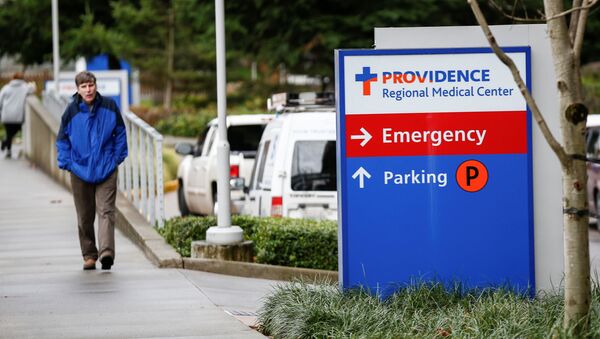“I think there’s always more that can be done. I think that things are starting to get a little bit better in terms of the testing situation. [Monday] reports from the … [US Centers for Disease Control and Prevention] CDC - with 42 state public health labs reporting - [show that] approximately 8,500 tests had been done, so that’s better than the 500 labs that had been done previously. Also, currently as of yesterday morning, 78 state and local public health labs in all 50 states were up and going. Some academic centers now have labs up and going. So, we’re heading in a better direction, but there's still a lot that needs to be done,” Kuppalli told hosts John Kiriakou and Brian Becker.
Several US states, including California, Washington, Florida, Kentucky, New York and Maryland, have already declared states of emergency in an effort to contain the novel coronavirus. Although there are currently 959 cases of the disease in the US, a new Cedars-Sinai study reveals that by March 1, more than 9,000 people in the US may already have been infected with the deadly virus.
Kuppalli said she expects the number of US cases will “go drastically up” as more people are tested: “I don’t think that anyone in public health disagrees that the more testing we do, the vast majority of the number of cases would go up … So, I think that we all know that testing is the bottleneck right now, and that’s really where we need to try and make some headway. We’re slowly making headway.”
“Everybody wants everything done yesterday, and so everybody is working on it. So, I know people working in public health are working around the clock 24/7. I think that hopefully in the next week or so, things are going to get much better and that we’re going to have a lot more positive cases,” Kuppalli explained.
On Tuesday, CDC Director Robert Redfield told Politico that US labs may not have enough supplies to extract genetic material from potential viruses in patient samples.
“The availability of those reagents is obviously being looked at,” he said, referring to chemicals used to get the genetic material ready for extraction. “I’m confident of the actual test that we have, but as people begin to operationalize the test, they realize there’s other things they need to do the test.”
It may soon be necessary to move from a containment to a mitigation methodology to combat COVID-19, Kuppalli added. For instance, Italy, which has more than 10,000 cases of the virus, has asked people to stay home and get permission for essential travel. In addition, the country has imposed a ban on public gatherings.
“Well, I definitely think that in certain aspects, in parts of the country, the horse is out of the barn, and we need to start moving from a containment aspect to a mitigation aspect. For example, where I am in California, they are very much moving toward a mitigation aspect. They’ve recommended canceling large gatherings. Actually, the county that I’m in - Santa Clara County - has said large gatherings over a certain amount of people aren’t going to be allowed, and they’re very much motivated on mitigation. And I think that’s something that we really need to start thinking about, not just in Seattle, California - in all parts of the country to try to help prevent spread of the disease,” Kuppalli explained.
There have been major shortages of toilet paper and cleaning supplies across the US amid coronavirus fears. Redfield told Congress a couple of weeks ago that healthy Americans do not need to mass-buy some supplies, Reuters reported.
“I think that is something that is becoming problematic, and I think that if you go out and about, and you go to stores, you’ll see that cleaning products are hard to find, and soap is hard to find, and hand sanitizer is hard to find, even online. Those are things that are becoming very difficult [to find] even in hospitals. Many hospitals are having to put their personal protective equipment under lock and key to prevent people from taking it. A colleague of mine had told me a story about people driving up to the hospital and trying to go inside and take supplies as well. These are things that are concerning and problematic, so they are definitely things that are happening,” Kuppalli explained.
Even though the number of global coronavirus cases has surpassed 118,000, the World Health Organization has yet to refer to the outbreak as a pandemic, instead opting to call it an epidemic.
“I think one of the things that I want to drive home is that it really is semantics in the sense that an epidemic is really transmission between counties, and a pandemic would be uncontrolled transmission worldwide. One of the things they really want people to focus on is: whether or not it is an epidemic or a pandemic, we still need to push forward, and we still need to continue to do all the things that we need to do,” Kuppalli explained.



